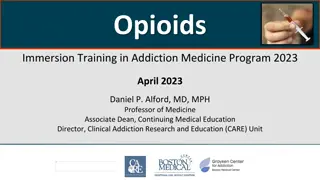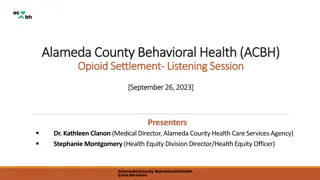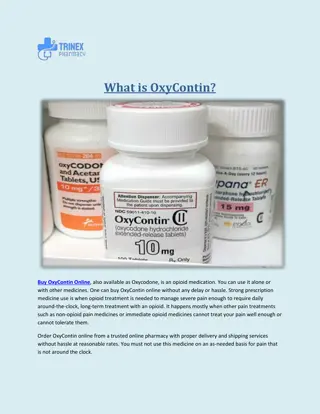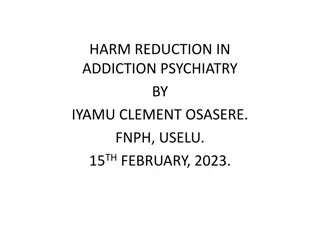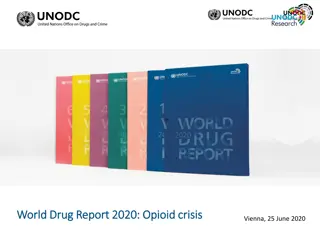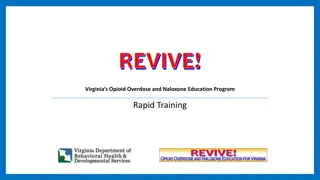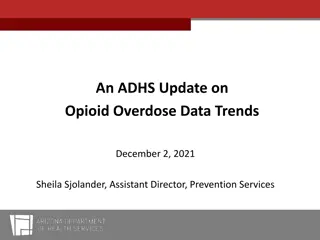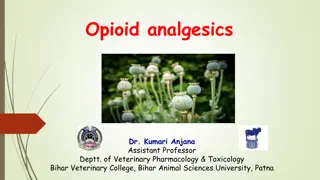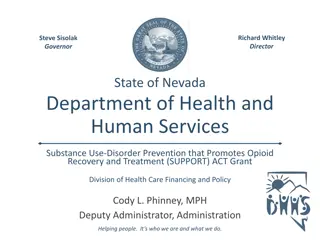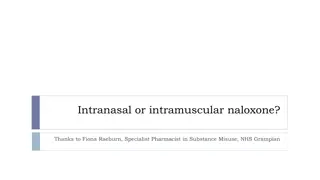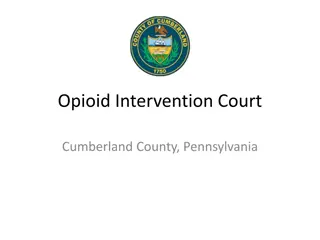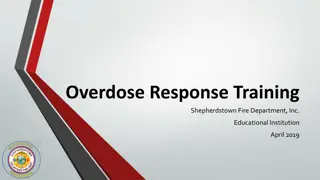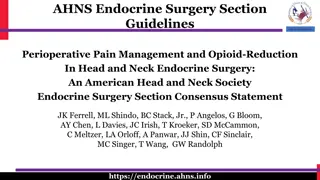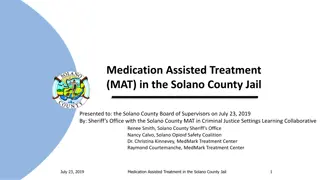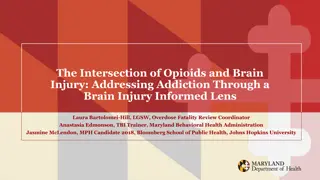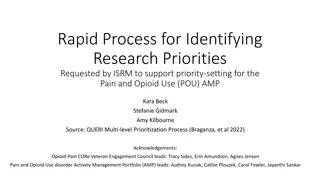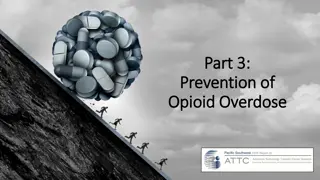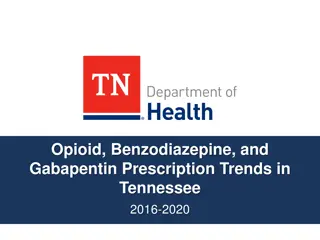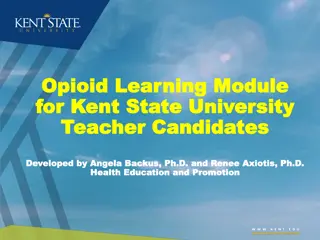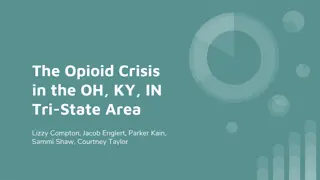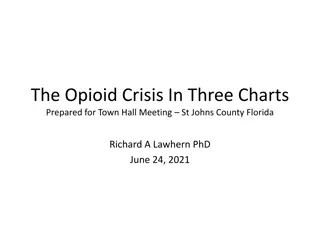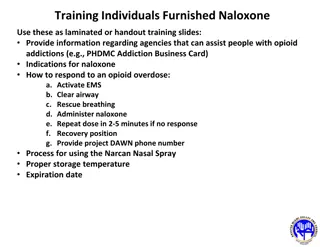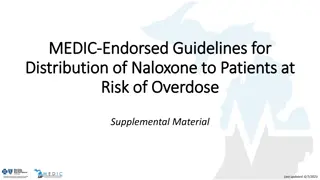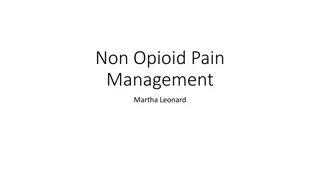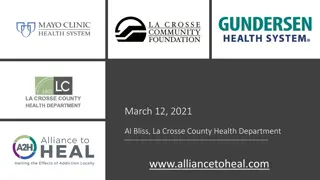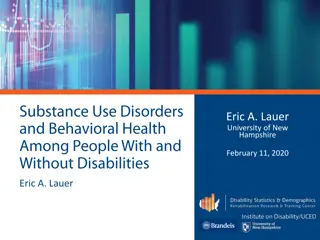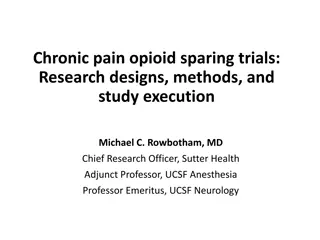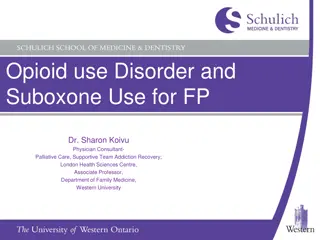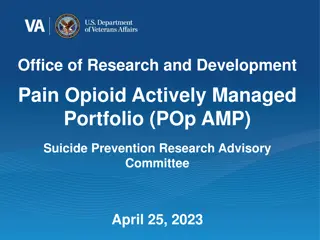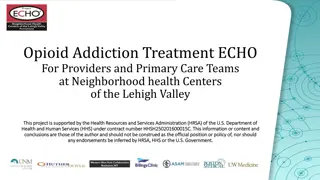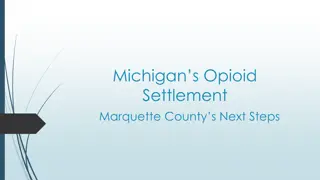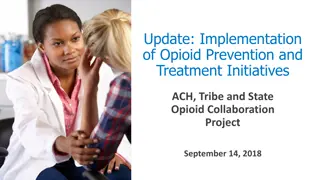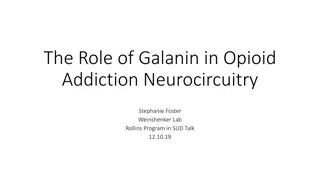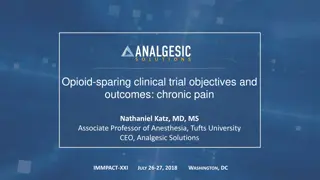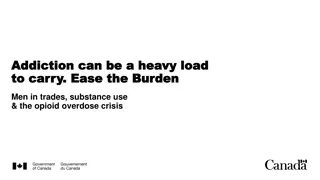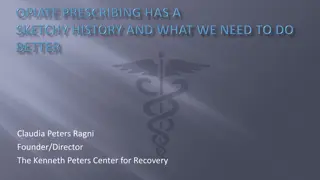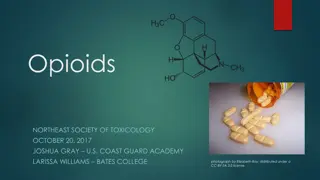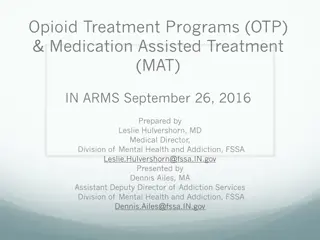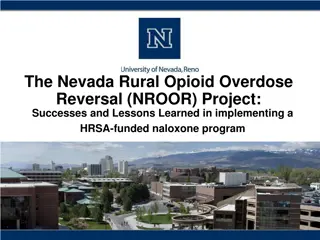Opioids Immersion Training in Addiction Medicine Program 2023
Opioids Immersion Training program led by Dr. Daniel P. Alford focuses on addiction medicine, including real case scenarios like opioid overdoses and the changing illicit opioid supply. The program addresses the natural history of opioid use disorder and the complexities of treating patients with op
0 views • 33 slides
Alameda County Behavioral Health Opioid Settlement Listening Session
Alameda County Behavioral Health (ACBH) conducted a listening session on September 26, 2023, addressing the opioid crisis, definitions of opioids, medication-assisted treatments, and current data on overdose deaths in the county. The session highlighted the rapid increase in opioid-related overdose
1 views • 31 slides
What is OxyContin
OxyContin, also available as Oxycodone, is an opioid medication. You can use it alone or with other medicines. One can buy OxyContin online without any delay or hassle. Strong prescription medicine use is when opioid treatment is needed to manage severe pain enough to require daily around-the-clock,
0 views • 4 slides
Harm Reduction in Addiction Psychiatry: A Comprehensive Overview
Harm reduction in addiction psychiatry is a client-centered approach that focuses on reducing negative consequences associated with substance use. This philosophy involves practical strategies and principles aimed at promoting safer drug use practices. The historical background traces the evolution
3 views • 40 slides
Overview of Opioid Crisis in North America and Africa
The opioid crisis in North America and Africa presents common threats and differing dynamics. Factors such as ease of manufacturing, interchangeability of fentanyl and tramadol, and market dynamics contribute to the crisis. In North America, high rates of prescription opioids have led to diversion a
1 views • 26 slides
Understanding Opioid Overdose and Naloxone Education Program in Virginia
The Virginia Opioid Overdose and Naloxone Education Program provide rapid training on opioids, overdose risks, naloxone usage, and emergency response protocols. Opioids include various drugs with potential overdose risk factors such as prior overdoses, reduced tolerance, mixing drugs, and certain me
0 views • 8 slides
Opioid Overdose Data Trends in Arizona
More than 5 Arizonans died from opioids daily in 2020. Opioid deaths totaled 2,500, with varying impacts on different counties. The monthly number of deaths peaked in mid-2020, declined, but increased again in 2021. CDC reported 2,005 opioid-related deaths in April 2021. The majority of fatal and no
0 views • 13 slides
Understanding the Opioid Epidemic: Awareness, Prevention, and Treatment
Learn about the opioid epidemic through information on opioids, incidence statistics, prevention methods, treatment options, and the HHS 5-point strategy. Discover the HOSA connection and educational resources to raise awareness and combat opioid addiction effectively. Take initiative with education
0 views • 9 slides
Understanding Opioid and Non-Opioid Analgesics in Pain Management
Opioid analgesics, such as morphine, act in the central nervous system to relieve pain without affecting consciousness. They differ from non-opioid analgesics like aspirin in terms of CNS depression, pain type targeted, and addiction potential. Pain is a protective mechanism caused by tissue damage
0 views • 25 slides
Substance Use Disorder Prevention & Opioid Recovery Initiatives in Nevada
Richard Whitley, Director of Nevada's Department of Health and Human Services, spearheads the Substance Use-Disorder Prevention that Promotes Opioid Recovery and Treatment (SUPPORT) ACT Grant program. The initiative focuses on areas like SBIRT, provider qualifications, Medicaid screening, MAT policy
0 views • 11 slides
Nasal vs Intramuscular Naloxone: A Comparison for Opioid Overdose Response
When administering naloxone for opioid overdose, choosing between nasal spray and intramuscular injection involves considerations such as ease of use, effectiveness in various conditions, and duration of action. Both methods have their advantages and may depend on individual circumstances. Nasal nal
0 views • 11 slides
Addressing the Opioid Crisis in Cumberland County, Pennsylvania
Cumberland County, Pennsylvania, faced a significant increase in opioid-related deaths and criminal dockets. To combat this crisis, an Opioid Intervention Court was established in 2018, following the Buffalo model. The court's structure, team composition, and response highlight a collaborative effor
0 views • 23 slides
Understanding Opioid Overdose Response Training
Learn about opioids, recognizing opioid overdose, and responding to emergencies in this educational training by Shepherdstown Fire Department. Get insights on opioid receptors, hierarchy of opioids, chemical anatomy, and factors putting individuals at risk. Equip yourself with the knowledge to admin
0 views • 29 slides
AHNS Endocrine Surgery Section Guidelines: Perioperative Pain Management and Opioid Reduction
The American Head and Neck Society Endocrine Surgery Section provides consensus statements on perioperative pain management and opioid reduction in head and neck endocrine surgery. Addressing the opioid addiction crisis, the expert panel offers guidelines on pain management strategies, opioid prescr
0 views • 18 slides
Medication Assisted Treatment (MAT) in Solano County Jail - Addressing Opioid Epidemic
Solano County Jail implemented Medication Assisted Treatment (MAT) to combat the opioid crisis, addressing high rates of opioid-related deaths and misuse in the county. National and local data on opioid use, overdose deaths, and access to treatment underscore the need for such initiatives. The Solan
0 views • 19 slides
The Intersection of Opioids and Brain Injury: Addressing Addiction Through a Brain Injury Informed Lens
Exploring the correlation between traumatic brain injury (TBI) and the opioid crisis, this content delves into the alarming statistics of opioid overdoses and their impact on individuals with brain injuries. Highlighting the overlap and consequences of these two major health issues, it sheds light o
0 views • 45 slides
Rapid Process for Identifying Research Priorities in Pain and Opioid Use
The Rapid Process for Identifying Research Priorities in Pain and Opioid Use involved a systematic approach to determining research gaps and unanswered questions in the Pain and Opioid Use domain. Through a multi-level prioritization process and engagement with various stakeholders, emphasis was pla
0 views • 20 slides
Understanding Opioid Overdose and Prevention Methods
The World Health Organization defines opioid overdose as a condition that can lead to respiratory depression and death, often identified by pinpoint pupils, unconsciousness, and respiratory depression. The statistics show a concerning rise in opioid-related deaths, emphasizing the urgent need for pr
0 views • 13 slides
Opioid, Benzodiazepine, and Gabapentin Prescription Trends in Tennessee 2016-2020
This report highlights the trends in opioid, benzodiazepine, and gabapentin prescriptions in Tennessee from 2016 to 2020. It addresses the increasing rates of drug overdose deaths, particularly opioid-related deaths. The data presented shed light on the measures and trends to combat the opioid crisi
0 views • 52 slides
Understanding Opioid Use and Prevention in School-Aged Children
This module developed by Angela Backus, Ph.D., and Renee Axiotis, Ph.D., for Kent State University teacher candidates provides an overview of Ohio House Bill 367 on Opioid Use Prevention, information on prescription opioids, heroin, fentanyl, national and state data on the opioid epidemic, how opioi
0 views • 26 slides
The Opioid Crisis in the OH, KY, IN Tri-State Area Research Study
This research study delves into the impact of the opioid crisis in the Ohio, Kentucky, Indiana tri-state area from 1999-2016. The study analyzed total deaths and crude death rates related to opioids, urbanization levels, unemployment rates, and high school graduation percentages at the county level.
0 views • 10 slides
Insights on the Opioid Crisis: Analyzing CDC Data and Policy Recommendations
Delve into the complexities of the opioid crisis through an examination of CDC data depicting the relationship between opioid addiction and overdose deaths. Contrary to popular belief, the crisis is not solely attributed to physicians over-prescribing opioids. Gain a deeper understanding of who is p
0 views • 10 slides
Opioid Overdose Prevention and Naloxone Use Training
This comprehensive training resource provides essential information on identifying opioid overdoses, administering naloxone, and responding effectively to opioid emergencies. Learn about agencies offering assistance for opioid addiction, indications for naloxone use, the process for using Narcan Nas
0 views • 12 slides
Understanding Opioid Epidemic Impact & Harm Reduction in Michigan
The Michigan Emergency Department Improvement Collaborative (MEDIC) works to improve emergency care quality, with a focus on opioid overdose. Over 3,000 Michiganders died from opioid overdose in 2021, exceeding motor vehicle-related deaths. Harm reduction strategies, like distributing naloxone in ED
0 views • 10 slides
Understanding Non-Opioid Pain Management Strategies
Non-opioid pain management is crucial in the current opioid epidemic, requiring physicians to navigate chronic pain without relying on opioids. This comprehensive approach involves a deep understanding of non-opioid analgesic medications, the nature of pain, anatomy, and physiology of nociception, t
0 views • 36 slides
Opioid Crisis and Prevention Efforts in La Crosse County
La Crosse County is tackling the opioid crisis through the Alliance to HEAL initiative, aiming to limit opioid supply, raise awareness, and reduce addiction, deaths, and crime. Data shows drug overdose deaths and opioid use trends from 2014 to 2020, highlighting the need for collaborative efforts to
0 views • 13 slides
Exploring Opioid Use and Disabilities in the United States
This presentation delves into the intersection of opioid use disorders (OUD) among individuals with disabilities, aiming to facilitate their access to appropriate treatment and recovery paths. Despite prevalent opioid-related morbidity, the impact on People with Disabilities (PWD) remains largely un
0 views • 17 slides
Exploring Opioid Sparing Strategies in Chronic Pain Management
This collection of research insights delves into the concept of opioid sparing in chronic pain management, highlighting the potential benefits of lower opioid doses, reduced need for opioids, and mitigating risks associated with opioid use. It discusses the challenges of opioid tapering, patient res
0 views • 18 slides
Opioid Use Disorder and Suboxone Use in Family Practice
Deaths related to prescription opioids are a significant concern in Canada, with opioid-related mortality impacting individuals prescribed opioids. Monitoring long-term opioid therapy is crucial, and guidelines emphasize caution in opioid prescribing practices. Opioid use disorder is a predictable c
0 views • 58 slides
Pain Opioid Actively Managed Portfolio (POp.AMP): Research Advisory Committee Overview
The Pain Opioid Actively Managed Portfolio (POp.AMP) focuses on addressing pain, opioid addiction, and suicide prevention through proactive management, agile funding mechanisms, and collaboration with various stakeholders. The committee utilizes a rotational leadership model to ensure efficient rese
0 views • 23 slides
Comprehensive Opioid Addiction Treatment Information for Providers
This project, supported by HRSA, provides valuable information on opioid addiction treatment, including medication options, effective interventions, and important considerations. Key topics covered include medication treatment, disclosures, medications for opioid use disorder, euphoria, and pharmaco
0 views • 24 slides
Michigan's Opioid Settlement: Marquette County's Next Steps
Michigan is set to receive a portion of a $26 billion national settlement with major distributors and Johnson & Johnson for opioid-related issues. Marquette County will receive around $1.9 million to address opioid-related challenges. The county is strategizing on how best to utilize the funds, invo
0 views • 4 slides
Washington State's Opioid Prevention and Treatment Initiatives Update
Washington State is actively implementing opioid prevention and treatment initiatives to address the rising opioid-related overdose deaths and disparities. The state's response plan includes tackling gaps in prevention, treatment, and recovery support to reduce the opioid disease burden. Key data hi
0 views • 74 slides
Understanding the Role of Galanin in Opioid Addiction Neurocircuitry
Galanin, a peptide expressed in the brain and periphery, has shown potential in protecting against opioid-associated behaviors. Studies have linked a GAL gene variant to heroin addiction and demonstrated Galanin's protective effects in rodents against opioid-related behaviors. Major questions revolv
0 views • 17 slides
Understanding Opioid-Sparing Strategies for Chronic Pain Management
In this detailed presentation by Nathaniel Katz, MD, MS, the concept of opioid-sparing strategies in chronic pain management is explored. The focus is on reducing opioid-related adverse effects while maintaining effective pain control through interventions such as modifying opioid exposure, pharmaco
0 views • 15 slides
Impact of Opioid Crisis on Men in Trades: Addressing Work Culture and Health Risks
The opioid overdose crisis has significantly affected men in trades, leading to a high number of opioid-related deaths and hospitalizations. This issue is exacerbated by factors such as over-reliance on pain medication, illicit drug use, and the high physical demands of their work. Men in trades oft
0 views • 28 slides
The Opioid Crisis: A Timeline of Addiction and Recovery Efforts
The opioid crisis traces back to the invention of heroin in 1874 and the subsequent increase in opioid prescriptions in the mid-1990s. Reassurances from pharmaceutical companies led to a surge in opioid use for non-cancer pain, contributing to addiction and overdoses. Efforts to combat the crisis in
0 views • 20 slides
Understanding Opioids and the Brain's Receptors
Opioids have a complex history, with substances like opium, morphine, and heroin playing significant roles. The opioid epidemic has highlighted the dangers associated with these drugs, including rising deaths due to fentanyl and synthetic opioids. Questions arise about why the brain has opioid recep
0 views • 22 slides
Understanding Opioid Treatment Programs and Medication-Assisted Treatment
Opioid Treatment Programs (OTPs) and Medication-Assisted Treatment (MAT) integrate behavioral therapy with medications for substance use disorders like opioid dependency. Combining medications with counseling offers a holistic approach to help individuals reduce or stop opioid use. The summary cover
0 views • 41 slides
Implementing Naloxone Program in Rural Nevada: Successes and Lessons Learned
The Nevada Rural Opioid Overdose Reversal (NROOR) Project focused on purchasing and distributing naloxone, training healthcare professionals, and improving health outcomes in rural areas with opioid overdose incidents. Led by dedicated project personnel and key partnerships, the program aimed to add
0 views • 33 slides
